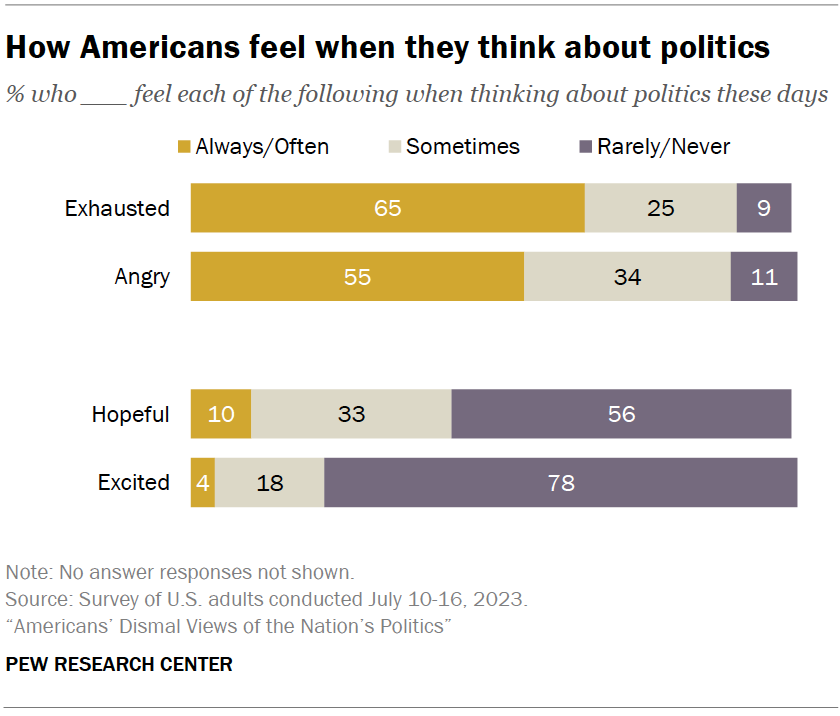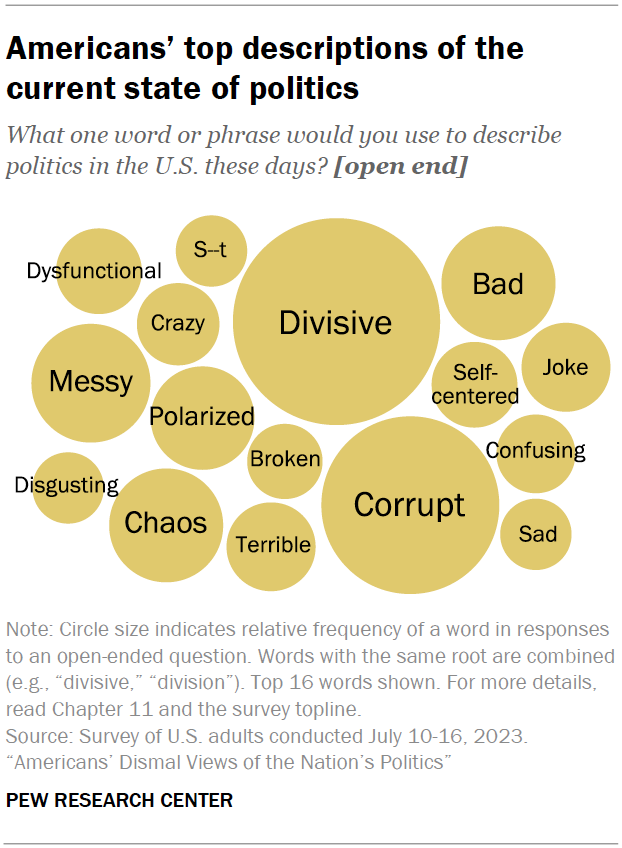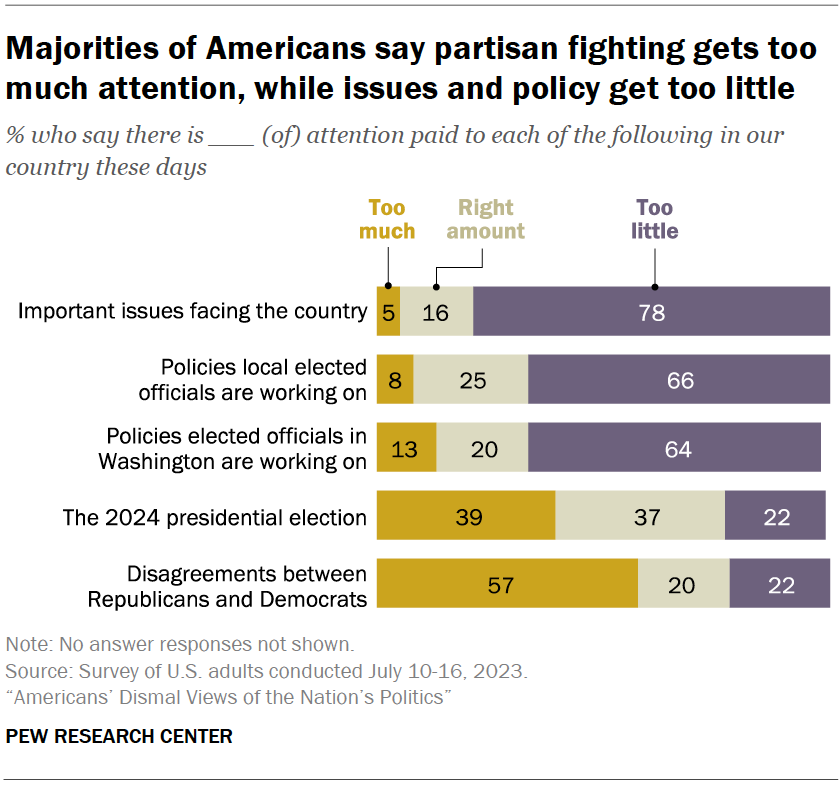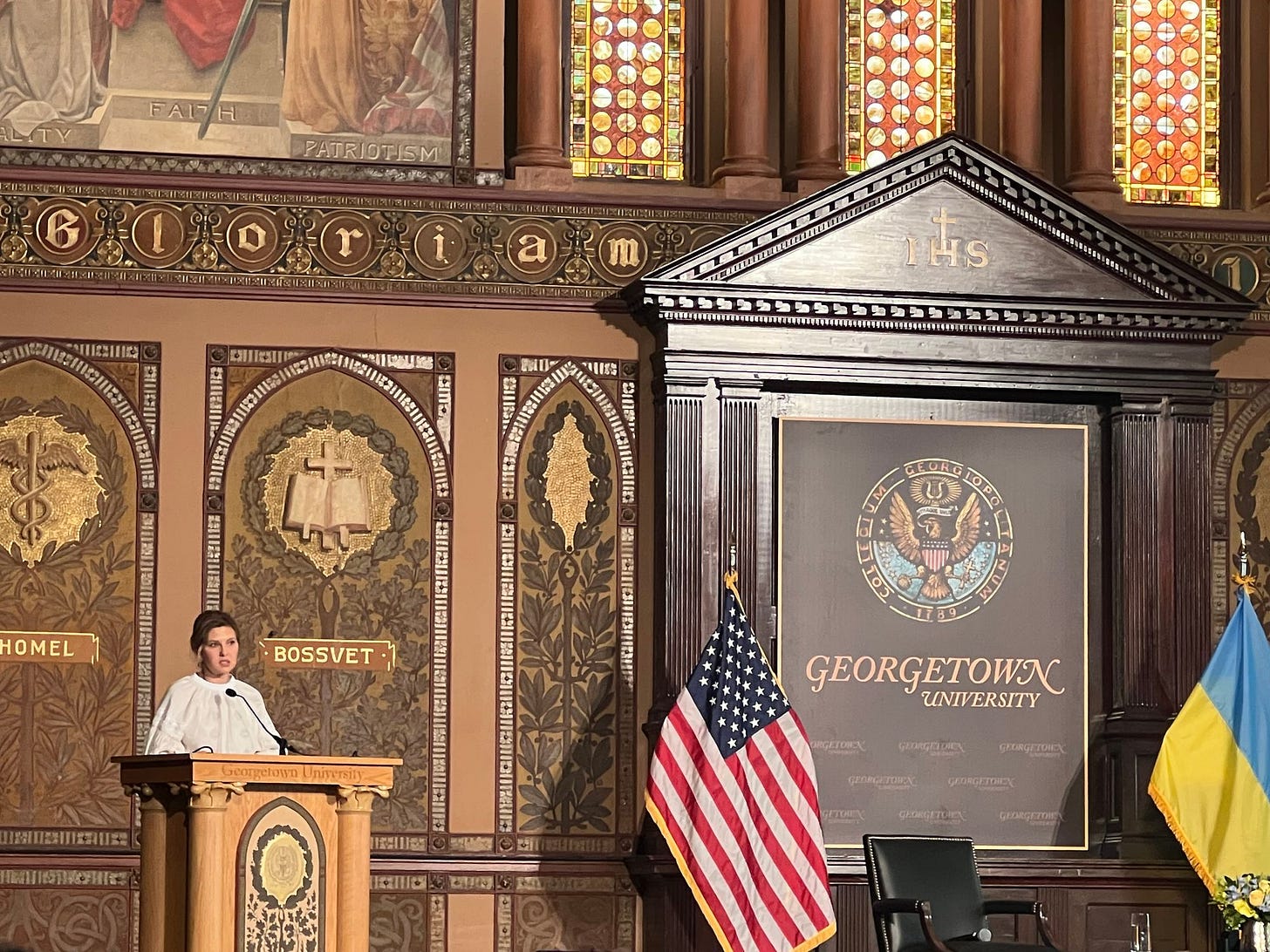A look at what’s working
A lot is going wrong in Washington right now. Let’s look at what’s going right.
Pew Research Center came out with a poll this week studying how Americans are feeling about the state of our politics. The results, as you can imagine, weren’t pretty.
Pick your data point: Just 4% of U.S. adults think our political system is working “extremely or very well.” 63% have little or no confidence in the system’s future. 65% said that when they think about politics, “exhausted” is the most frequent emotion that comes to mind.
And then there was this image — in some ways even starker than the numbers — showing the most common words that voters offered when asked to describe American politics.
“Divisive.” “Dysfunctional.” “Disgusting.” Not great.
Trust me: I understand as much as anyone why these sentiments exist. But as someone who spends a lot of time trying to think up ways to explain and illuminate American politics for a general audience, it’s distressing to think that all I might be doing is making people angry and exhausted. I hear that all the time in my inbox: people unsubscribing from the newsletter because they just don’t want to be thinking about politics anymore. It always makes me sad — not because of what it means for my mailing list, but because of what it means for our country.
Luckily, the Pew poll also includes some advice for those of us in the media.
57% of Americans said partisan fights between Democrats and Republicans are receiving too much attention. 78% said the “important issues facing the country” receive too little attention; 64% said the same about “policies elected officials in Washington are working on.”
As regular readers of this newsletter know, that’s exactly why I spend every Friday talking about the policies that actually are advancing through Washington, often on a bipartisan basis.
It can feel weird doing that after a week like this, which was marked by so much dysfunction. A government shutdown is looming, congressmen are falling “asleep at the switch,” resolutions are circulating via baby changing tables, and congressional staffers are marching into each other’s offices staging protests while wearing raccoon-skin hats (seriously).
And yet, there is still function in Washington, too. I think that’s important to highlight — and clearly the American people agree with me. And maybe it’s one small way of climbing out of our political depressive state.
Before we dive in, a quick ask: Putting together this Friday roundup can take a lot of time and research. I’ve thought about putting it behind a paywall — but I stop myself each time because I believe firmly that everyone should be able to access information about what their government is doing, no matter their economic situation.
But if you are able to give, it would mean a lot if you could donate to support my work. You can click here to contribute, on a one-time or recurring basis. If you’re reading things below that you aren’t seeing in other news outlets, I hope you’ll consider donating. Your support truly goes a long way towards making sure I can continue offering this type of coverage.
And now, here’s your look at what Washington got done this week:
The House
Nearly 3 million Vietnam veterans are estimated to have been exposed to Agent Orange, the chemical herbicide then used by the U.S. military. That exposure can impact not only the soldiers, but their children as well: more than 1,500 veterans’ children suffer from Agent Orange-linked spina bifida.
The House unanimously passed S.112 this week, which requires the Department of Veterans Affairs to provide such children with “health care, job training, and monetary benefits” for their entire life. The Senate already passed the bill unanimously in July, so it’s now headed to President Biden’s desk for his signature.
The House also unanimously passed the Veterans Benefits Improvement Act and the Isakson-Roe Education Oversight Expansion Act. The former would help streamline the process of claiming veterans benefits, while the latter would increase oversight of educational institutions that accept VA funding in order to cut down on schools defrauding veterans using their GI benefits.
Finally, the chamber voted 378-22 to pass the Native American Child Protection Act, which would reauthorize programs to prevent, investigate, and prosecute Native American child abuse and neglect through 2028. The measure would revise the existing program to ensure that grant money goes to “culturally appropriate” programs, including organizations from within the Native community. The bill would also create a National Indian Child Resource and Family Services Center to provide assistance to Native tribes.
The Senate
Last December, the Federal Communications Commission (FCC) held its latest auction of 5G spectrum licenses, part of its long-term strategy to make 5G internet service — which is faster and more reliable — available to all Americans.
T-Mobile was the big winner from that auction, spending $304 million to buy 90% of the licenses being sold — racking up more than 7,000 new licenses in total. But, in March, the FCC’s spectrum licensing authority lapsed, and Congress has yet to renew it, which means the agency is unable to issue the licenses that T-Mobile already bought.
Enter the 5G SALE Act, which the Senate passed unanimously this week. The bill does not fully renew the FCC’s authority — but it would at least allow the agency to issue the previously purchased licenses. According to T-Mobile, these licenses cover counties in all 50 states and Puerto Rico — including many rural areas that currently lack strong internet service. In total, the company says, issuing the licenses would improve connectivity for nearly 50 million Americans.
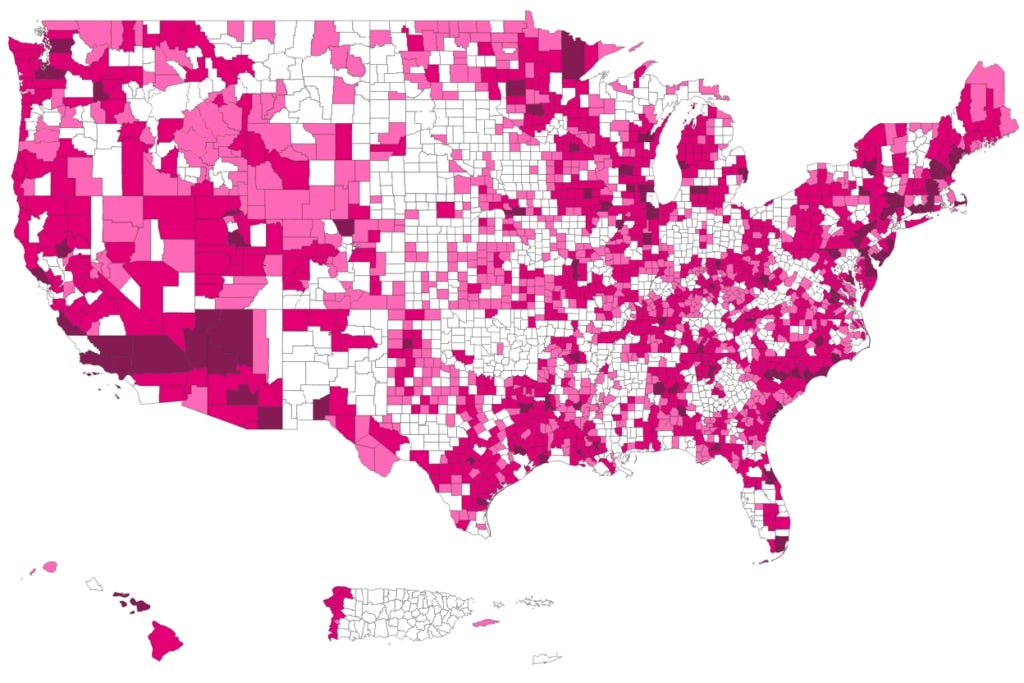
Outside of legislation, the Senate also began voting to confirm several military nominees after months of delays brought on by Sen. Tommy Tuberville (R-AL).
Gen. Charles Q. Brown was confirmed as chairman of the Joint Chiefs of Staff by an 83-11 vote. Gen. Randy George was confirmed as Army Chief of Staff by a 96-1 vote. Gen. Eric Smith was confirmed as Marine Corps Commandant by a 96-0 vote.
The Senate also voted to confirm two new U.S. district court judges, by votes of 53-44 and 52-45. Finally, the chamber voted unanimously to confirm a new judge to the U.S. Court of Federal Claims, which hears monetary claims against the government. That confirmation marks the first time in 10 years that the federal claims court has had no vacancies.
The administration
As I’ve chronicled in this space before, young voters are a big vulnerability for President Biden heading into 2024. So it’s notable that several of the Biden administration’s actions this week fulfill some of the loudest demands from young activists.
Later today, Biden is set to announce the first-ever White House Office of Gun Violence Prevention, which March for Our Lives (the advocacy group formed out of the Parkland school shooting) has been calling for since he took office. The office, which is charged with implementing new actions to reduce gun violence, will be helmed by Vice President Kamala Harris, who has been traveling across the country on a college tour in another attempt to reach young voters.
Earlier this week, Biden unveiled the American Climate Corps, a reimagining of the New Deal-era Civilian Conservation Corps (CCC) for the modern age. According to the White House, the initiative will aim to train 20,000 young people for jobs related to clean energy and conservation. The idea is one that Sunrise Movement, a youth climate group, has been pushing for years; Biden originally proposed it in his “Build Back Better” package, but it was left on the cutting room floor. The White House did not explain where the money from the program will be coming from or how much will be spent on it.
Also this week: the Consumer Financial Protection Bureau launched the rulemaking process for a regulation that would remove medical debts from Americans’ credit reports, requiring creditors to only take non-medical information into account when considering loan applications.
The Department of Homeland Security expanded Temporary Protected Status (TPS) for Venezuelan migrants, which will allow more than 470,000 Venezuelans to receive permits to work in the U.S. and shield them from deportation for the next 18 months. The move — one of the largest TPS expansions ever — followed significant pressure from New York City politicians, who argued that the city’s social services would have been weighed down by the influx of migrants unless they were allowed to work.
The Education Department canceled $37 million in student loan debt for 1,200 borrowers who were misled by the for-profit University of Phoenix. The Department of Health and Human Services announced that it will once again allow Americans to order free Covid tests starting on Monday.
Finally, President Biden launched a worker’s rights initiative with Brazil and authorized the appointment of a dedicated Federal Disaster Recovery Coordinator for East Palestine, Ohio, to oversee the recovery efforts after the February derailment of a train carrying toxic chemicals.
A video to cleanse your political palette.
Finally, here’s a video along these same lines, showing that people with very different political orientations can get along in Washington and have fruitful policy discussions.
Rep. Tim Burchett (R-TN) is one of the most conservative members of the House, one of the ringleaders of the efforts to gum up the spending process right now. Pete Buttigieg, of course, is a dyed-in-the-wool Democrat and the Biden administration’s Transportation secretary.
Which means you might not have expected them to have a civil conversation at a congressional hearing this week. But they did!
All the “gotcha” questions had already been asked, Burchett joked, so “I’m just going to ask you some serious stuff if that’s okay with you, brother.” And he did! They had a substantive exchange about transportation policy, which ended with Buttigieg promising to call Burchett after to follow up about a seemingly small but important issue.
“Thank you, brother,” Burchett said before yielding back his time. “It’s been a pleasure.” Take a few minutes to watch. If learning about the bipartisan veterans and 5G bills that were passed this week didn’t renew your faith in politics at least a little, maybe this will:
More news to know.
BREAKING, via the Associated Press: “U.S. Sen. Bob Menendez of New Jersey and his wife were indicted Friday on charges that they took bribes of cash, gold bars and a luxury car for a range of corrupt acts, including having the Democrat use his influence over foreign affairs to benefit the authoritarian government of Egypt.”
“A search of the couple’s home turned up $100,000 in gold bars and $480,000 in hidden cash, said prosecutors, who announced the charges against the 69-year-old Democrat nearly six years after an earlier criminal case against him ended with a deadlocked jury.”
Congress leaves for weekend with no shutdown solution in sight / Axios
UAW to strike more GM, Stellantis facilities, has made progress with Ford / Reuters
Before I go...
While Ukrainian president Volodymyr Zelensky was at the Capitol yesterday, his wife Olena Zelenska made a stop at Georgetown.
Zelenska came to donate 260 books about Ukraine to Georgetown, as part of her “Ukrainian Bookshelf” project, which aims to increase Ukrainian studies programs at foreign universities — and protect Ukrainian literature.
“When we hand over our living books, we are saving them physically,” Zelenska said, noting that many libraries and universities in Ukraine have been destroyed. “We are giving them a chance at life.”
“Books sustain us,” she added, calling them a “mental shelter” in times of hardship.
Zelenska noted that 81 universities in Ukraine have been damaged during the war; many students spent the first day of school this year in bomb shelters, as air raid sirens rang out across the country.
Asked how the Ukrainian people are hanging on amid such horror, the first lady said there was three crucial elements:
Gratitude. “Thankfulness, doctors tell us, is something that makes us more resilient.”
Mutual support. “There’s nobody that’s not helping somebody else. [Helping] helps us psychologically as well.”
Contact with each other. “Psychologists tell us we are social animals and we need to stay together.”
Thanks for reading.
I get up each morning to write Wake Up To Politics because I’m committed to offering an independent and reliable news source that helps you navigate our political system and understand what’s going on in government.
The newsletter is completely free and ad-free — but if you appreciate the work that goes into it, here’s how you can help:
Donate to support my work or set up a recurring donation (akin to a regular subscription to another news outlet).
Buy some WUTP merchandise to show off your support (and score a cool mug or hoodie in the process!)
Tell your family, friends, and colleagues to sign up at wakeuptopolitics.com. Every forward helps!
If you have any questions or feedback, feel free to email me: my inbox is always open.
Thanks so much for waking up to politics! Have a great day.
— Gabe






